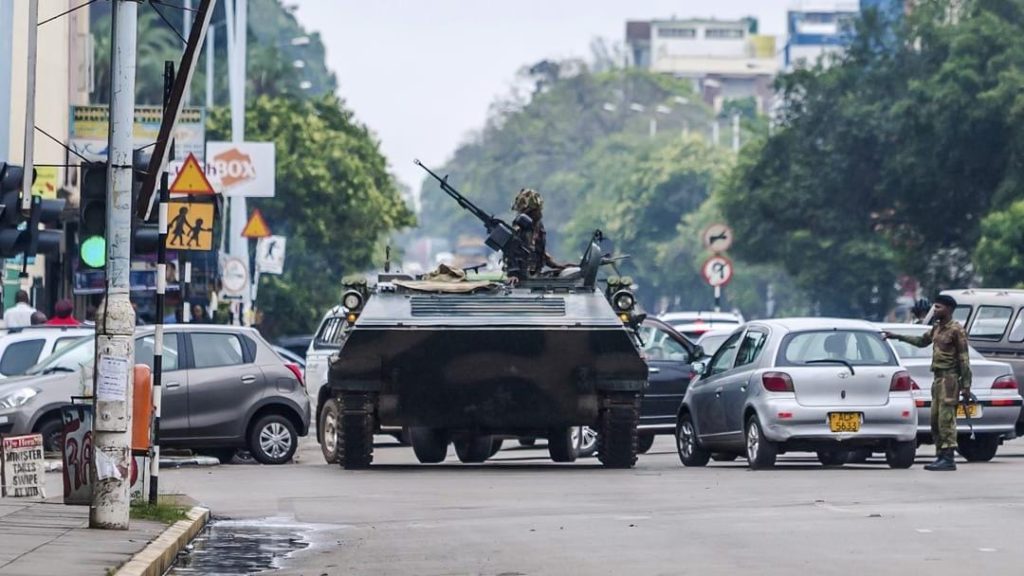The Zimbabwe Defense Forces have taken control of the country. What exactly happened?
The crisis burst into the open on 6 November when President Mugabe fired Vice President Emmerson Mnangagwa and expelled him from the ruling Zimbabwe African National Union-Patriotic Front (ZANU-PF) party. Mnangagwa has been aligned with the military and Zimbabwe’s National Liberation War Veterans Association, and had been in a fierce struggle for power in the race to succeed the country’s 93-year-old leader. His principal opponent was Grace Mugabe, the president’s wife, who heads a rival faction of ZANU-PF veterans known as the G40, leads the women’s wing and is popular among young party activists.
The army then unambiguously stepped in. A statement on 13 November by the commander of the Zimbabwe Defence Forces, General Constantino Chiwenga, called for an end to the unfolding purge of party elements that took part in Zimbabwe’s fifteen-year war of liberation from white rule, and warned that the army would intervene against any threat to the integrity of the revolution that led to Zimbabwe’s independence in 1980. Almost 24 hours later, the party’s spokesperson, Ambassador SK Moyo, accused Chiwenga of treasonous utterances and overstepping his mandate. Then, early on 15 November, troops took control of the government’s media headquarters and other important buildings.
The military urged the sixteen million Zimbabweans to “limit unnecessary movement” and have called for calm among key components of the state, the judiciary, parliamentarians, the security sector, churches, youth formations, traditional leaders and other political actors. Military vehicles were parked on the streets, but on the morning of 15 November this did not discourage Zimbabweans from going about their lives almost as normal. Incidents of violence appear to have been minimal, with few reports of gunfire and some of beatings. There is no evidence of overt division within the security sector.
An effective news blackout from the state media has however made people reliant on international and social media, and speculation is rife. A great variety of sentiments are being expressed, from relief and excitement that Mugabe’s long reign may be finally over, to a profound nervousness that what follows could be even worse.
Does the military action spell the end of Robert Mugabe’s 37 years in power?
Mugabe appears to have lost power, but not his position as president, at least in the first two days after the military move. At 01:26 in the early hours of Wednesday 15 November, an army spokesman delivered a written statement on national television and radio claiming the military had taken action, “targeting criminals around [President Mugabe] who are committing crimes and are causing social and economic suffering in the country to bring them to justice”. The statement said the president and his family were safe and that “as soon as we have accomplished our mission, we expect the country to return to normalcy”.
South African President Jacob Zuma confirmed Mugabe is “confined to his home”, as is apparently his wife, Grace. But Mugabe’s personal position remains unclear on many fronts.
Does the military’s action constitute a coup d’état?
This is a very peculiar kind of coup. Effectively there has been a military takeover, but the army has not declared martial law, the suspension of the constitution, or the deposition of the country’s head of state. The military and those such as War Veterans who supported a robust pushback following Vice President Mnangagwa’s dismissal have been at pains to argue that they are not pushing for a coup. Outside powers are also at pains not to use the word “coup” in relation to current events.
Yet General Chiwenga’s statement on 13 November had the hallmarks of threatening to seize power. He said that unless Mugabe took appropriate steps there would be a military intervention, albeit to address an apparent security threat perceived in both the ruling party and the country at large.
The situation, he argued, warranted action and was in line with the military’s previous interventions in internal ZANU-PF disputes, enacted to ensure the ruling party and its revolutionary objectives were not hijacked. It would appear that Mugabe was either unable or refused to take the steps being demanded, setting in motion Chiwenga’s promised action.
–
The military’s televised broadcast maintained that “we wish to make it abundantly clear that this is not a military takeover of government. What the Zimbabwe Defence Forces (ZDF) is doing is to pacify a degenerating political, social and economic situation in our country which if not addressed may result in violent conflict”. The statement urged important arms of government and social constituencies to remain focused and calm.
